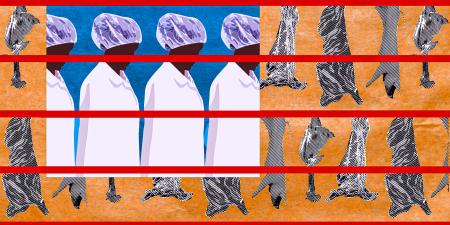Abstract
Meat consumption and production produce a wide range of health and social consequences. The AMA Code of Medical Ethics and Principles of Medical Ethics do not speak directly to the issue of meat consumption. However, the AMA Code and Principles do provide guidance for physicians when considering their obligations to educate and counsel patients.
Meat Consumption and Production
Meat production and consumption in modern society have come under increased scrutiny because of their worldwide influence on both individual and public health, as well as their broader impact on the global climate. The ethical issues are varied, encompassing such problems as diet-related illness, obesity, harm to the environment, and cultural conflicts. While the American Medical Association (AMA) Code of Medical Ethics does not speak directly to issues regarding meat, it certainly offers physician guidance on issues related to meat consumption and production, such as preventive care, patient rights, and community improvement.
Health Promotion and Preventive Care
Meat consumption has well-known linkages to obesity and other health problems.1 Physicians should be aware of such associations and consider what role they should play in preventive measures. Opinion 8.11, “Health Promotion and Preventive Care,” explains that physicians have a “professional commitment to prevent disease and promote health and well-being for their patients and the community.”2 Opinion 8.11 further notes:
The clinical encounter provides an opportunity for the physician to engage the patient in the process of health promotion. Effective elements of this process may include educating and motivating patients regarding healthy lifestyle, helping patients by assessing their needs, preferences, and readiness for change and recommending appropriate preventive care measures. Implementing effective health promotion practices is consistent with physicians’ duties to patients and also with their responsibilities as stewards of health care resources.2
Fulfilling this ethical obligation in the context of meat consumption may require physicians to educate their patients on dietary choices regarding meat and to offer solutions or alternatives to help reduce meat consumption with the aim of preventing chronic disease.
Patient Rights
Meat consumption is often tied to culture and identity. Patients have a right to respect and dignity, which includes respect for their culture and respect for their treatment decisions. Opinion 1.1.3, “Patient Rights,” states that “health and well-being of patients depends on a collaborative effort between patient and physician in a mutually respectful alliance.”3 Hence, any discussion physicians have with their patients regarding meat consumption should be mindful of meat’s place in a patient’s cultural life. Physicians should understand that the impacts of meat consumption go beyond nutrition and should work with their patients—by incorporating patients’ cultural needs and wishes—in crafting a nutrition plan that is both medically sound and ethically appropriate.
Improving Communities
The broader environmental impacts and global risks of meat consumption and production are now widely understood.4 Some examples of global risks directly related to industrialized meat consumption are deforestation and forest fires, climate change, human rights abuses, wildlife extinction, and the increased frequency of zoonosis and pandemic risk.4,5 Considering these significant consequences and their impact on global public health, physicians should be mindful of ways they can help contribute to reducing these risks. The Principles of Medical Ethics call on physicians to “recognize a responsibility to participate in activities contributing to the improvement of the community and the betterment of public health.”6 Satisfaction of such a broad obligation as outlined in this principle may involve physicians making efforts—through education, individual patient interaction, or other initiatives—to reduce meat consumption in society. Likewise, the AMA Code details an obligation for political advocacy in Opinion 1.2.10, “Political Action by Physicians,” which states that physicians have an “ethical responsibility to seek change when they believe the requirements of law or policy are contrary to the best interests of patients.”7 Physicians are already advocating for political change with regard to dietary policy. For example, the Physicians Committee for Responsible Medicine is currently lobbying the federal government to focus on “policy goals that would highlight the benefits of plant-based nutrition to improve our nation’s widening health disparities.”8
References
- Wang Y, Beydoun MA. Meat consumption is associated with obesity and central obesity among US adults. Int J Obes. 2009;33(6):621-628.
-
American Medical Association. Opinion 8.11 Health promotion and preventive care. Code of Medical Ethics. Accessed April 28, 2022. https://www.ama-assn.org/delivering-care/ethics/health-promotion-and-preventive-care
-
American Medical Association. Opinion 1.1.3 Patient rights. Code of Medical Ethics. Accessed April 28, 2022. https://www.ama-assn.org/delivering-care/ethics/patient-rights
-
González N, Marquès M, Nadal M, Domingo JL. Meat consumption: which are the current global risks? A review of recent (2010-2020) evidences. Food Res Int. 2020;137:109341.
-
Brown N. 7 reasons why meat is bad for the environment. Greenpeace. August 3, 2020. Accessed April 28, 2022. https://www.greenpeace.org.uk/news/why-meat-is-bad-for-the-environment/
-
American Medical Association. AMA principles of medical ethics. Code of Medical Ethics. Revised June 2001. Accessed April 28, 2022. https://www.ama-assn.org/about/publications-newsletters/ama-principles-medical-ethics
-
American Medical Association. Opinion 1.2.10 Political action by physicians. Code of Medical Ethics. Accessed September 20, 2022. https://www.ama-assn.org/delivering-care/ethics/political-action-physicians
-
Physicians call on White House to focus national nutrition policy on less meat, more plant-based food consumption. News release. Physicians Committee for Responsible Medicine; July 15, 2022. Accessed September 20, 2022. https://www.pcrm.org/news/news-releases/physicians-call-white-house-focus-national-nutrition-policy-less-meat-more-plant



